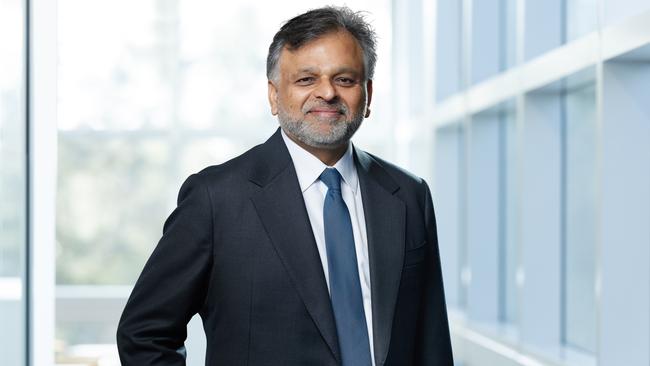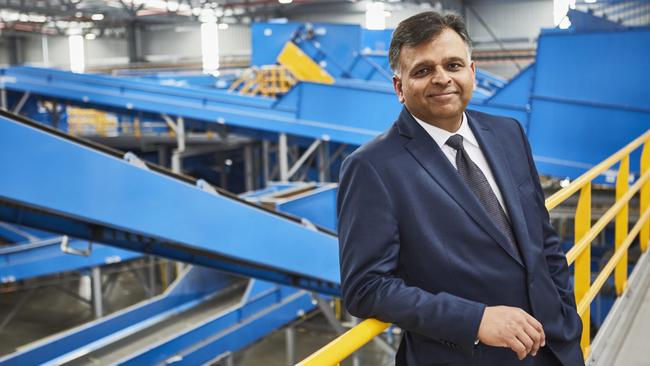The polarising CEO driving the Stokes family’s $3.1bn play for Boral
Half of Boral’s senior execs have left since Vik Bansal became boss, but the polarising CEO has doubled profits and drawn a $3.1bn takeover offer from the Stokes family.

Boral chief executive Vik Bansal describes himself on X, formerly known as Twitter, as “fiscally conservative, socially progressive”.
Few would argue with his first self-characterisation. Some would disagree with the latter.
The 58-year-old boss of one of Australia’s biggest construction supply companies is currently in the midst of what can only be described as a remarkable turnaround – not just in the performance of the company he leads, but also in restoring the views of the man himself.
Boral’s market value has doubled since his appointment to run the company was announced in June 2022 by the billionaire Stokes family, which had grabbed majority control a year earlier.
His profit drive has been so successful that this week the Stokes family’s Seven Group – which saw value in selling 1 per cent of Boral last year at an average price of $4.90 – shocked the market with a backflip offer to take over the whole company for as much as $6.25 per share.
The $3.1bn bid to buy the 28.4 per cent of Boral it doesn’t already own comes as most of the building industrials sector is in play. It also reflects Bansal’s success in pivoting the nation’s biggest cement maker from billion-dollar losses to a profit in a few short years.
Bansal, it appears, can do no wrong. With investors at least.
His staff may not all agree.
Since taking the reins of Boral about half the firm’s senior management have walked out the door.
It is difficult to tell where the truth lies in these departures. One person who would not be named says they couldn’t stand his management style, but the company says that some highly paid executives didn’t have the ability or the desire to help turn the company around.
One former Boral executive says their idea to fix a problem was criticised as being “emasculating”, and said Bansal was “not a modern manager.”
Unfortunately for Bansal his reputation is there for the taking as allegations regarding his leadership style have been made in the past.
He left his previous role running Cleanaway Waste Management under a cloud of questions about his leadership style. Shares in Cleanaway had risen 300 per cent in the six-year reign of Bansal, whose appointment ended a revolving door of CEOs and turned the company into a highly focused waste management giant.

Former Cleanaway chairman Mark Chellew, who presided over Bansal’s time there, says it was very difficult to tell whether the allegations – which included “challenging” a senior manager’s authority in an inappropriate manner – had merit.
“It’s very hard to tell, but he has moved beyond that now,” says Chellew. “I enjoyed working with him. He is a great CEO. He is very hardworking. He is a focused guy and he did a good job at Cleanaway.”
None of the allegations were ever proved. But Bansal may have realised he had overstepped the mark at times, leading to an internal email cited in the Australian Financial Review where Bansal wrote he could “always do better and should have done better in areas highlighted by the employees who are unhappy with my leadership.”
One fund manager who has supported Bansal from even before his time at Cleanaway, back when he was running InfraBuild, is Jun Bei Liu from Tribeca Investments.
Liu believes Cleanaway was “too conservative” in getting rid of him and she “has a lot of faith” in him at Boral.
Given his expertise in turning around underperforming companies, Liu says he would undoubtedly be a tough boss.
“He must be a tough manager, otherwise how on earth do you drive through these significant changes?” she says. “He can articulate a strategy very clearly and he drives results to get (a company) back on track.”
Speaking of the executives who have departed, she says employees should remember the firm was facing job cuts before he came on board.
“Boral was in the ditches,” says Liu. “He is driving a strategy that is better for everyone in the end and for their bonuses.”
To be sure, many roles would have become redundant or appeared as “fat” to be trimmed after the company exited its Australian and Asian plasterboard operations and sold off $US4bn of American assets to focus on cement, concrete and asphalt.
The uncertainty around redundancies can send people running for the door regardless. Research by the Academy of Management showed getting rid of just 1 per cent of a workforce results in a 31 per cent increase in turnover on average.
Bansal now has 12 direct hires, whereas there were nine reporting to the CEO when he started. It’s understood five of those nine have left.
The company refused to confirm the exact number of direct reports who have left, but says there has been a “reshaping of roles … which is not uncommon when a new leader and a new strategy is put in place”.
“Vik Bansal came into the business with a clear mandate to turn around the performance of Boral as CEO and MD and reverse the trend of long-term underperformance overseen by the previous management team,” a spokesman says.
He is clearly succeeding at a faster rate than even the Stokes family could have predicted.
Boral shares closed at $5.91 on Friday, up 2c. .
At its half-year results a week ago, Boral announced earnings before interest and tax had risen 111 per cent on the previous corresponding six months to $201m. That figure is almost as much as it contributed to the entire 2023 earnings.
Boral leapfrogged Coates Hire to become the second biggest contributor to Seven Group’s earnings behind its WesTrac Caterpillar franchise.
The Stokes family have made business decisions in their publicly held companies that most boards would not have the grit to. Hiring a man like Bansal, whose exceptional performance as a CEO was damaged by the allegations at Cleanaway, is clearly one of those, says Liu.







